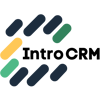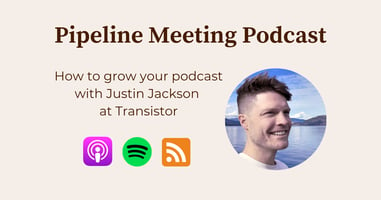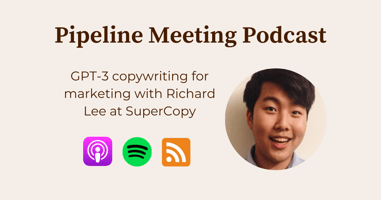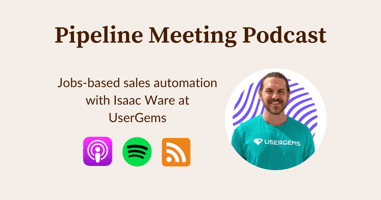Justin Jackson, the co-founder of Transistor, joins for part two of a two-part interview series on...
Growing a podcast hosting business with Justin Jackson at Transistor
Justin Jackson is the co-founder of Transistor.fm, the podcast hosting company that hosts this podcast. In part one of our interview series, Justin talks about growing a podcast hosting business.
Show Description
Where B2B marketers come to talk sales. 15-minute interviews published every Monday and Wednesday morning. For heads of marketing and founders who support a sales team.
Subscribe
Popular Platforms
Apple Podcasts
Spotify
RSS Feed
Also available:
Amazon • Anghami • Castbox • Castro • Deezer • GoodPods • Google Podcasts • iHeart Radio • Overcast • Pandora • PlayerFM • Pocket Casts • Podcast Index • Podchaser • Stitcher • TuneIn
Show Notes
Justin Jackson is the co-founder of Transistor.fm, the podcast hosting company that hosts this podcast. In part one of our interview series, Justin talks about growing a podcast hosting business.
He talks about their business model as a software company, how they serve podcast agencies, and provide podcast websites. He also takes a step back to provide his perspective on the podcasting industry and market trends.
Justin shares specific insights about the total market, number of active podcasts, and how different platforms compare He specifically contrasts podcasting with the video hosting marketing, looking to YouTube in particular.
By the way, here's a link if you're looking for tips on how to start a podcast.
Find Justin Jackson on LinkedIn: https://www.linkedin.com/in/justinijackson/
Learn more about Transistor: https://transistor.fm/
Transcript
[00:00:00] Pipeline Meeting Intro
---
[00:00:00] Harris Kenny: Welcome to Pipeline Meeting where marketers come to talk about sales. I'm your host Harris, Kenny, and I'll be joined by guest every Monday and Wednesday for brief 15 minute interviews where we'll share tips that you can apply to support your sales team and help them close more deals.
[00:00:15] Harris Kenny: If you don't have time to listen to this whole episode, you can skip ahead in the show notes in your podcast player, or find the transcript at introcrm.com/podcast. All the episodes are published there.
[00:00:28] Harris Kenny: Before we get started just a quick note. I'm trying something different with this episode. I'm joined by Justin Jackson, who's a co-founder and also runs go to market for transistor.fm. They're a podcast hosting company that actually hosts this podcast.
[00:00:42] Harris Kenny: I've had enough heads of marketing asked me about podcasting over the last few months that I thought you might find it interesting too.
[00:00:48] Harris Kenny: And while this doesn't have the focus on sales that we often talk about, it is growth related and people are looking at this as a new channel to get their brand in front of more people, engage customers, and get new leads for their business.
[00:00:59] Harris Kenny: In this first interview, we're going to talk about podcasting itself. And then in the next one we're going to focus on starting and growing a show, distribution, and getting in front of the right people.
[00:01:09] Harris Kenny: If you're thinking about starting a show to increase brand awareness or potentially drive new leads to your team, email me at podcast@introcrm.com. I'd love to hear what's on your mind. With that let's get into it.
[00:01:19] Podcast services
---
[00:01:19] Harris Kenny: I'm curious why I've seen other podcasting companies do services around, we'll bring your show to market and stuff like that. I have ideas about why Transistor doesn't do that, but have you thought about that?
[00:01:30] Justin Jackson: I think we still could, if it was the right it, first of all, it would require us to hire a lot more people and we just really like having a small team. Those kinds of businesses are just, uh, more people intensive. The more people you hire, the more kind of risk and stress and if there's a downturn, you might have to scale people back.
[00:01:52] Justin Jackson: If there's not enough leads and sales filling that bucket, you have to kind of go up and down. We just didn't really wanna run that business. And honestly, software is just, it's higher margin and more relaxed in terms of, we do a lot of customer support, but it's just much lower touch than we would have to be if we had services on top.
[00:02:19] Justin Jackson: And the other thing is that there's just so many good agencies doing that work already. We would rather just have them use our software. some of them are just really good at that. Like they're building relationships with, for example, one agency that's a customer of ours, they just do work with like big nonprofits and grant organizations and things like that.
[00:02:46] Justin Jackson: If we were gonna do that, we would need to like have a sales process. We'd need to hire some sales people, we'd need to hire some producers and some editors and everything else. And he's just running a whole company where he just does that.
[00:02:59] Justin Jackson: We flirted with it a little bit. Like, we're like, oh, maybe we should do that part cuz there's, some of our competitors have it. But I honestly think it's such a different business. It's probably just a distraction from making good software. And in our case, we just wanna make really good product.
[00:03:17] Harris Kenny: Mm-hmm.
[00:03:18] Justin Jackson: And scale that as opposed to, be really good at the production services side and scale that, I think it's easier to just stay in your lane and go that way.
[00:03:29] Serving podcast agencies
---
[00:03:29] Harris Kenny: Would you tilt the software that way? Like would you tilt the software to maybe better cater to agencies?
[00:03:35] Justin Jackson: Our business model already attracted those customers. So being able to start multiple podcasts on one account for one price, so lots of agencies just have their one account and they just put all their clients on their, on that account, and it's great for them.
[00:03:49] Justin Jackson: It's not expensive to sign up for a Transistor account. A lot of these branded podcasts especially they don't get, you know, millions of downloads. It's cheap for the agency to host with us. We solve so many problems for them. They only have to train their staff on one piece of software, and the staff can manage multiple show.
[00:04:13] Justin Jackson: You can assign different staff to different shows. So we already built a lot of this in. And it's flexible in that it also works for podcast networks. It also works for a company like IBM that would have multiple shows under one account. And it works for an individual creator that might have multiple shows.
[00:04:32] Justin Jackson: So the software in that case was really flexible.
[00:04:35] Justin Jackson: I was just at a conference and I spoke with an agency owner and he's one of our longest running customers. They're great customers. And so getting his feedback, I'm definitely listening when he's giving us feedback, because making those customers happy, like they sign up and they start using us and if they like the software that they'll just be like, we are using this forever and, we're just gonna put, we're gonna transfer all shows on competing products over to us.
[00:05:06] Justin Jackson: Talking to those customers and listening to how they're using us and kind of discerning where the opportunities and gaps are that we could fill. That's the game from my perspective is to just make the product really fit their way of doing things and help them to make more money and help them to make happier clients and all that kind of stuff.
[00:05:28] Justin Jackson: That's probably strategically where we want to go.
[00:05:32] Podcast websites
---
[00:05:32] Harris Kenny: Mm-hmm. So when you think about growth and like is, this Transistor websites thing to me is really interesting because it feels really polished
[00:05:42] Justin Jackson: Mm-hmm.
[00:05:44] Harris Kenny: You know, having used Transistor for a bit and had a podcast that was, that, that had a Transistor site, and now seeing where it's growing, to me it feels like just from the outside, like a little bit of like a horizontal exploration of, okay, well what if we continue to be a software company, but we sort of look at this adjacent space next to podcasts.
[00:06:06] Justin Jackson: I think in that case it was like we were already really, podcast hosting is very much like the web hosting market. And if you're in the web hosting market, you're at least tangentially involved in the CMS market and really podcasting, especially from the beginning we had a CMS, we have a page where you're creating an episode and you have to put in title and then you have to add some media, like an MP3 file and you have to add an image and then you have to write out a bunch of content and you have to click publish.
[00:06:39] Justin Jackson: So it's already a CMS.
[00:06:41] Justin Jackson: And it was like, well how can we take this and offer something that people want already, which is a website for their podcast that's already a best practice. And then we experimented with like, maybe this could be a way of acquiring customers, which is to give, make that available to anybody with a podcast, whether you're hosted on Transistor or not.
[00:07:02] Justin Jackson: That experiment's been okay. Like I thought we were gonna get thousands of people using it right off the bat. And I think we're still like, maybe 300 people have created a site so far. So maybe that's one of those experiments that, no, 215, so it's pretty low.
[00:07:21] Justin Jackson: Might be one of those experiments, marketing experiments where it's just gonna take time to get the word out, get the search traffic, all that stuff.
[00:07:30] Justin Jackson: It was also the most embarrassing thing about Transistor for a long time is that the website stuff wasn't as good as it could have been. It was like a, something that we, John, my, my partner built really quick for our first customer, and then we just kept it for two years.
[00:07:46] Justin Jackson: I was like, we gotta get rid of this. This is like, we gotta improve on this. So I don't think we would ever, like Libsyn, which is one of our competitors, they also have a actual web hosting and website CMS platform. I don't think we'll do that. It's so hard to be in our lane already and, I want us to keep growing, but I want us to keep growing at 10, 15% revenue every year.
[00:08:15] Justin Jackson: That's kind of the ideal.
[00:08:18] Podcasting industry
---
[00:08:18] Justin Jackson: We don't need, in terms of scale, honestly, once we hit a million dollars in annual revenue, that was already kind of like enough in a sense of this will give us and our team a good life and good salaries and everything else. And I wanna keep growing because 10, 15% a year feels that's like nice, that's like a nice healthy growth trajectory.
[00:08:47] Justin Jackson: But we're not looking to grow by, you know, two x and three x and four X every year. It also just feels cancerous to me. , it's like that kind of grows as just like not healthy. I don't think it produces like healthy teams. in the beginning you need to
[00:09:03] Justin Jackson: grow by those numbers because you want to hit a million dollars a year in revenue for a small team or 2 million or whatever.
[00:09:11] Justin Jackson: Podcasting as a market has a ceiling we're always gonna hit up against, I think like in terms of like podcasts that have been updated in the last month, even though there's 4.5 million podcasts out there, I think that updated in the last month is like 150,000 or something like that.
[00:09:32] Justin Jackson: We're talking about a small market. I mean even 4 million or 4.5 million podcast total is small. There's like, I don't know, 50, 60, a hundred million YouTube channels. and probably 600 million blogs or something like that. Podcasting is still tiny. And so that's gonna affect our potential for growth.
[00:09:53] Justin Jackson: Is Transistor gonna be a $1 billion revenue business in five years? There's no way, there's just no way that that's gonna happen. The, the entire, advertising portion of the podcast market is only 1 billion a year. That's like that entire category. Is only 1 billion. So yeah, if we wanted to grow crazy, we would have to go into like website hosting and services and all this other stuff.
[00:10:20] Justin Jackson: But this category has a high enough ceiling that's still, every year grows about 10, 15% a year that it's like, that's perfect, let's just stay there.
[00:10:32] Justin Jackson: Venture capitalists are coming into podcasting and big publicly traded companies like Spotify are coming into podcasting and they wanna grow it big.
[00:10:40] Justin Jackson: They wanna blow their roof off of it. For them, 10, 15% growth a year is not good enough. And the total market size is not good enough for them. They want big, big numbers. They want there to be 500 million podcasts or 60 million podcasts or whatever, and for an indie company, we don't need that.
[00:11:03] Justin Jackson: We just need the pie to be big enough for us to have a reasonable income and pay our people well and have a good life.
[00:11:10] Centralization vs. Decentralization
---
[00:11:10] Harris Kenny: I feel like some of these bigger companies are trying to sort of edge out RSS standard.
[00:11:16] Justin Jackson: Oh, yeah, they are.
[00:11:17] Harris Kenny: I mean that feels like a consolidation move a little bit, right? Of like, okay, well maybe there, maybe there is a ceiling here, so maybe we should start trying to just capture more of this market that's maybe smaller than we thought, and then we can extract more later when we control it.
[00:11:33] Justin Jackson: Yeah. I think they want both. I mean, for sure. If, if podcasting was centralized, the way that YouTube is centralized, and I mean, YouTube is also a big podcast player now. For sure it would be bigger in the sense that there would be more shows, there would be more people creating shows. Centralization in tech does create that effect.
[00:11:55] Justin Jackson: They would grow it just by centralizing it. I don't think that's good for society. On the other hand, I'm I, I'm like for sure they would love to do that. Like YouTube wa that, that was YouTube's uh, you know, before YouTube came along, there was iFilm and Adam films and a bunch of smaller video hosting platforms and after YouTube started, there was Vimeo and uh, Wistia and some other ones that have done okay.
[00:12:23] Justin Jackson: But YouTube loves owning the whole video stack that's amazing for them and for Google. Every big multinational megacorp wants this. They want total dominance. they want to dominate everything. It's the same way Microsoft wanted every computer to be running, uh, MS-DOS and Windows eventually.
[00:12:47] Justin Jackson: Right? That's the game. You, you, if you own everything, then yeah, you can extract massive profits. That's why we have Monopoly laws, right.
[00:12:57] Justin Jackson: they want that stuff for sure. But I don't think it's healthy for society. So RSS is a lot more mess in terms of, now when someone publishes a podcast RSS feed, they have to submit it to multiple directories and apps like Apple and Spotify and Google and Amazon and Overcast and PocketCasts.
[00:13:16] Justin Jackson: Like, that's messier. But the benefit you get for that mess is actually substantial. Meaning no one organization or entity owns this thing in the same way that nobody owns email. We're not paying Microsoft, uh, postage fee every time we send or receive an email. It's an open protocol that's kind of owned by society.
[00:13:41] Justin Jackson: Same with TCP/IP, it's like every time you send a packet of data over the internet, you're not paying some, you know, party to, uh, gatekeeper to like let it through. It just, it's free flowing. And it could have gone another way, but, uh, that's not the way it worked. We have these open shared protocols that anyone can use.
[00:14:04] Justin Jackson: In the case of the internet, I think we really need those things. And in case of indie businesses building on top of those protocols. They're awesome for indie businesses.
[00:14:15] Justin Jackson: Some of the biggest Bootstrapped companies have been built on top of email, MailChimp, convert kit, uh, user list, customer list, customer.io, campaign monitor.
[00:14:29] Justin Jackson: These are all bootstrapped companies or that were bootstrapped companies. And why? Because emails open. It's an open protocol. It gives a spot for independents to compete. Uh, whereas that was a lot harder in something like, search, you know, Google just owns that category. And even a massive company like Microsoft, their best effort is like maybe three to 6% of that market.
[00:14:56] Pipline Meeting Outro
---
[00:14:56] Harris Kenny: That's all for now. You can find show notes at intro crm.com/podcast. The theme music for Pipeline Meeting is by Neighbourhood Vandal. If you learned something, consider sharing this show with a friend. Thanks for listening.



